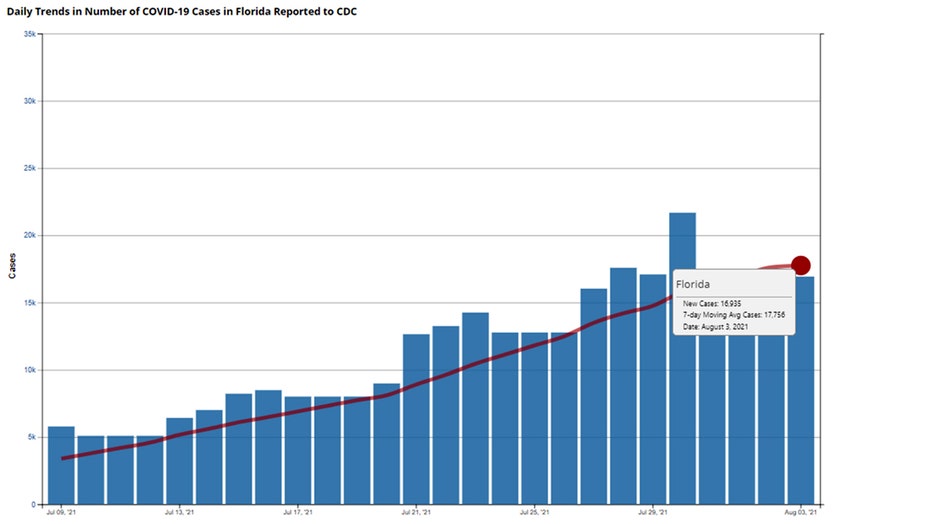COVID-19 spike: In Florida hospitals, 'there are only so many beds'
Nearly all COVID patients at Sarasota hospital unvaccinated
Doctors Hospital in Sarasota was the first in Florida to diagnose and treat a COVID-19 patient. Numbers have ebbed and flowed. Three weeks ago the hospital was COVID free, but the number of COVID patients has increased 10-fold since then.
FORT LAUDERDALE, Fla. - A South Florida hospital chain is suspending elective surgeries and putting beds in conference rooms, an auditorium and even a cafeteria as many more patients seek treatment for COVID-19.
"We are seeing a surge like we’ve not seen before in terms of the patients coming," Memorial Healthcare System’s Chief Medical Officer Dr. Marc Napp said Wednesday during a news conference in Hollywood.
Napp said they’ve opened up an additional 250 beds at Memorial’s six hospitals in Broward County.
Unlike during last year’s spring and summer COVID surges when many sick people tried to avoid hospitals for fear of catching the virus, patients suffering from other ailments are also seeking treatment now, Napp explained.
RELATED: Chance of hospitalization, death less than 0.01% for fully vaccinated, data shows
On Wednesday, there were more than 1,600 inpatients admitted for overnight stays across the system’s facilities. Typically, the health system doesn’t have more than about 1,400 inpatients under its care at a time.
"This is the highest number of patients Memorial has ever seen," he said. "It’s the sheer number coming in at the same time. There are only so many beds, so many doctors, only so many nurses," Napp said.

Graph of daily cases reported by Florida to CDC, as of Wednesday, August 4
Across Florida, more than 12,000 patients were hospitalized with COVID-19 on Wednesday, and nearly 2,500 of them were in ICU beds. On Tuesday, the Centers for Disease Control and Prevention reported more than 50,000 new COVID-19 cases in Florida during a three-day span, raising the seven-day average to one of the highest counts since the pandemic began. In total, the state has seen more than 2.6 million cases and 39,179 deaths.
Gov. Ron DeSantis has rejected calls to enforce CDC recommendations that nearly everyone wear masks indoors until vaccination rates increase significantly. The Republican leader says deciding whether to mask up or get the shots must remain an individual choice, and meanwhile it’s important to keep Florida’s economy moving.
DeSantis blasts Biden after criticism over handling of pandemic in Florida
Florida Gov. Ron DeSantis fired back at President Biden, one day after the president criticized the Republican governor for his handling of the pandemic as the Sunshine State sees a record spike in COVID-19 cases and hospitalizations.
"Florida is a free state, and we will empower our people. We will not allow Joe Biden and his bureaucratic flunkies to come in and commandeer the rights and freedoms of Floridians," DeSantis, who has been exploring the possibility of running for president in 2024, said in a fundraising email Wednesday night.
At Memorial, Napp said the patients being treated for COVID-19 are largely unvaccinated.
The COVID-19 vaccines were designed to prevent severe illness and death, and none are 100% effective, so public health experts have always expected a small number of "breakthrough" cases with milder infections among the vaccinated. Some of those sickened in this latest surge took all the necessary precautions.
Long wait at clinic for long-haul COVID patients
By some estimates, one out of three people who get COVID will have long-term effects. Last year an internist at Watson Clinic in Lakeland opened a clinic specifically for the so-called long haulers. She started off with a few patients, now has more than 250 and a six month waiting list.
Fort Lauderdale retirees Doug and Judi Custer said they did everything they were told to ward off the virus. They both got vaccinated and continued to wear masks at the grocery store, even when mandates were lifted.
So when Judi Custer, 75, got a sore throat a few weeks ago, she didn’t think much of it. Even with the cough and fever, "that never entered my mind that it could be COVID," she said.
Her 80-year-old husband also had a cough, chills and terrible headaches. So after a friend informed her that a few people they’d recently been in contact with tested positive, she got tested for COVID at an urgent care center, just to be safe. Her husband refused.
She was shocked when the test came back positive. Her husband’s condition deteriorated rapidly. He struggled to breathe and spent five days in the hospital, where they put him on oxygen.
She started feeling better, but was concerned for her husband, a retired teacher. With hospitals now overcrowded, she was not allowed to visit him. Their daughter flew home to help.
RELATED: Younger, unvaccinated COVID-19 patients filling Bay Area hospitals
"Continue to be cautious and careful and take all the measures you can. Even though you think you’re immune to getting COVID, you’re still vulnerable to it," she said in a phone interview.
"It’s not just you if you choose not to get vaccinated," she said sitting beside her husband, who is still using oxygen and slowly regaining his strength. "You are making it more difficult for other people, and to get us back to normalcy of life in our country."
"The immunization is there. We’ve had it long enough to know it is helping people even if they get sick with it, like us you’re less likely to be put on a ventilator, you’re less likely to be hospitalized," she said. "I wasn’t hospitalized. You’re less likely to get it as severe."

